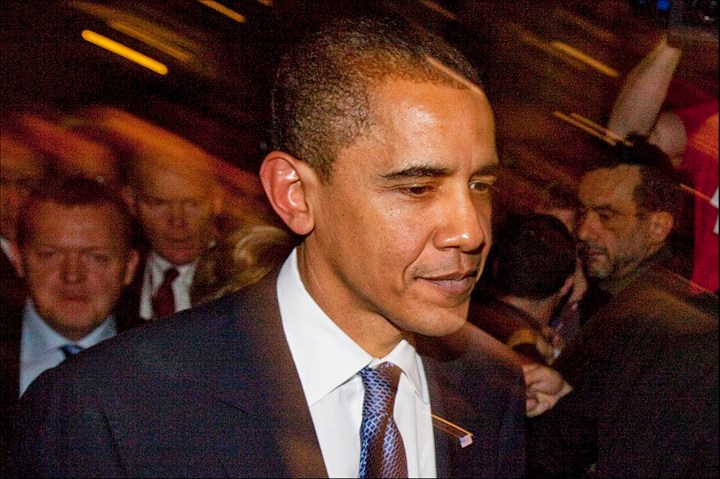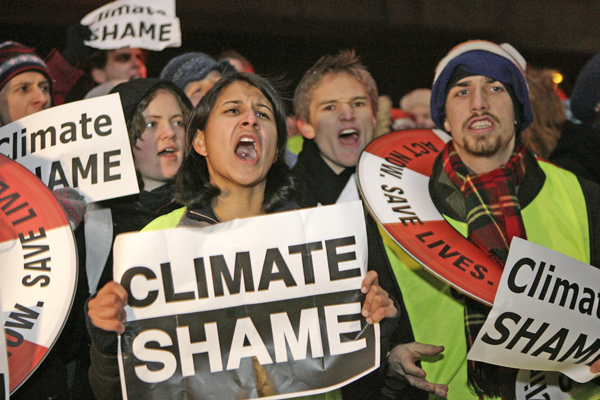Business Maverick, Politics, Sci-Tech
Copenhagen’s half a loaf: praise and criticism for Obama

Amidst global praise and criticism about the climate conference’s results, late on Friday, Barack Obama told the international media that five major nations - China, India, Brazil, South Africa and the US - had finally cobbled together a climate deal on the last day of the summit, just as the conclave seemed on the verge of total collapse. Well, sorta.
Obama, who departed Copenhagen almost immediately after his speech so that his aircraft could land in Washington before a major winter storm hit the American capital, called the result “an unprecedented breakthrough.” But, he, too, had to admit that the agreement was still less than what was actually needed to combat global warming fully.
When Obama stood to announce the agreement and to ask others to fall in behind it, regardless of its imperfections, to some observers he was speaking at an international gathering in the way he would have been speaking to the American congress, in effect: the enemy of the good is the perfect. As Obama explained, “I’m sure that many consider this an imperfect framework. No country will get everything that it wants.” For Obama, too, this seems to have been a learning experience as he learns the impact of his powers of persuasion – and its attendant limitations.
U.S. President Barack Obama sits with South Africa’s President Jacob Zuma, Brazil’s President Luiz Inacio Lula da Silva, Chinese Premier Wen Jiabao, Indian Prime Minister Manmohan Singh and other world leaders during a multi-lateral meeting at the Bella Center in Copenhagen December 18, 2009. REUTERS/Larry Downing
While the agreement did tackle many key issues the conference was supposed to address, delegations from many participating nations were less than happy. For example, European nations are now left with the only binding carbon control regime in the world and representatives from the poorest, most vulnerable, nations were angry to having been left out of the final, crucial negotiations.
By early Saturday morning, the representatives of the 193 countries who had gathered in Copenhagen had not yet approved the deal – and there were even signs they might not do so. However, Barack Obama, in speaking of the negotiated agreement, noted that it was a political statement and not the legally binding treaty many had sought and so this accord might not need formal ratification by the entire conference as a globally binding accord.
The three-page agreement, that was finally crafted between the five nations and then offered to the conference, did not set a 2010 goal of a binding international treaty. Nor does it commit rich – or poor – nations to firm mid- or long-term targets to reduce greenhouse gas emissions. Having said that, observers do agree that the accord is significant at least for codifying a commitment by the world’s nations to act on their own to address global warming. As Obama said in Copenhagen before returning to the US, “for the first time in history, all major economies have come together to accept their responsibility to take action to confront the threat of climate change.” Obama added that the conference’s results “did not come easily, and we know that this progress alone is not enough.”
What does the resulting accord do? First of all, it provides for a system of monitoring and reporting on progress toward national pollution-reduction goals. This is a compromise position with the Chinese who had bargained extremely hard to allow for measuring of progress towards greenhouse gas reductions to be undertaken nationally.
Further, it calls on rich nations to transfer hundreds of billions of dollars to those countries most vulnerable to a changing climate. The deal promises to deliver $30billion of aid for developing nations over the next three years, and outlines a goal of providing $100 billion a year by 2020 to help poor countries cope with the impacts of climate change. It included $10 billion in annual funding from rich nations for the next three years but the $100 billion still represents only an aspirational figure. The accord establishes a global goal of limiting the earth’s temperature rise to 2 degrees Celsius above pre-industrial levels by 2050. But, this figure also implies some really serious reductions globally for greenhouse gas emissions by the year 2050.

Photo: Demonstrators shout outside the Bella Center as they protest against the draft text on climate change produced by negotiators at the Copenhagen Climate Change Conference December 19, 2009. REUTERS/Ints Kalnins
For many, however, this accord represents a disappointing conclusion for a two-year process that organizers and supporters intended as the way to produce a comprehensive, legally binding plan to address the global climate change challenge. Instead, this untidy compromise was a microcosm of what many charged was a chaotic, poorly managed and run international conference that set no goal line for a fully binding treaty, and left uncertain its actual implementation. The results from the conference mean it is almost certain it will take years of additional negotiation before an internationally enforceable version of the accord finally emerges from the aftermath of Copenhagen’s shambles.
Some environmental and climate NGOs did give the Copenhagen accord a modest thumbs up. As Carl Pope, executive director of the Sierra Club (one of America’s oldest environmental groups) said, “The world’s nations have come together and concluded a historic — if incomplete — agreement to begin tackling global warming. Tonight’s announcement is but a first step and much work remains to be done in the days and months ahead in order to seal a final international climate deal that is fair, binding, and ambitious. It is imperative that negotiations resume as soon as possible.”
But others were less praiseworthy. Alden Meyer, of the Union of Concerned Scientists, was scathing in his assessment. “This is a sort of ‘incomplete, I didn’t turn in my term paper’ when it should have gotten a failing grade.” And John Sauven, executive director of Greenpeace UK, said, “The city of Copenhagen is a crime scene tonight, with the guilty men and women fleeing to the airport. There are no targets for carbon cuts and no agreement on a legally binding treaty. It is now evident that beating global warming will require a radically different model of politics than the one on display here in Copenhagen.”
For the US, actual adherence to the Copenhagen accord will require significant congressional support – especially if funding is involved. With politicians like Massachusetts Democratic senator John Kerry, chairman of the Foreign Relations Committee and lead on the Senate’s climate change bill, the view was, “This can be a catalyzing moment. President Obama’s hands-on engagement broke through the bickering and sets the stage for a final deal and for Senate passage this spring of major legislation at home.”
There were, however, less approving voices from other delegates from other nations. For example, one of the G-77’s most visible spokesmen throughout the conference, Sudanese diplomat Lumumba Stanislaus Di-Aping, said, “The developed countries have decided that damage to developing countries is acceptable,” explaining that a 2-degree target “will result in massive devastation to Africa and small island states. Today’s events, which really are a continuation of the history of the negotiations for the last two years, represent the worst development in climate change negotiations in history.” Clearly, Di-Aping is not a cheerleader for this particular accord.
On Friday, after he gave his originally scheduled remarks earlier in the day, Obama met privately with Chinese Premier Wen Jiabao. China’s growing greenhouse gas emissions represent the biggest challenge to forging a binding global pact. The final Copenhagen deal began to coalesce once the two leaders had chances to discuss the specifics of a likely compromise agreement, in a bid to salvage the talks. Until that point, China had been strongly resisting proposals for external, independent monitoring of each county’s claimed emissions cuts, while the United States had said this was central to any real deal in Copenhagen.
The accord actually began to gell when Obama and Hillary Clinton marched into a meeting of the Chinese, Indian and Brazilian leaders. Obama told the others that, here, on the final day, he did not want them negotiating in secret. While it may have put some senior noses seriously out of joint among the participating parties, the resulting intrusion also led to conversations that cemented the central terms of the deal. This final agreement grew out of an earlier, interim discussion document that was being edited by officials from twenty-four countries during the busy, exhausting Friday deliberations.
The resulting accord left out a variety of more specific points in favour of more general statements of intent, such as a proposed collective agreement to reduce worldwide greenhouse gases by 50% in four decades – including drops of 80% among developed nations. Also no longer in the final document was a call to reach a binding accord no later than November 2010. The final version simply said the agreement had to be reviewed and put into place by the middle of the coming decade.
The document does set out a framework for verification of emissions commitments and establishes a “high-level panel” to assess financial contributions by rich nations to help poor countries on emissions. Ultimately, to seal the deal, the US gave up on an objective of formalizing the global target of lowering carbon emissions in half at the mid-century. Developing countries, fearful of the impact such a limitation would have on their economies, were unwilling to accept this limitation.
Speaking about the breakthrough, Sergio Serra, Brazil’s senior climate negotiator, said, “After several discussions had taken place, they were joined by President Barack Obama. Several important decisions were taken — not a few due to Brazilian mediation — that we hope will bring a result, if not what we expected, that may be a way of salvaging something and pave the way to another meeting or series of meetings to get the full result of this proceeding.”
UK PM Gordon Brown and German chancellor Angela Merkel called the Copenhagen accord a good first step, but that more action towards a binding treaty was still needed. And Xie Zhenhua, the head of China’s delegation, put the best face on the results of China’s diplomacy, saying, “The meeting has had a positive result, everyone should be happy. After negotiations both sides have managed to preserve their bottom line. For the Chinese, this was our sovereignty and our national interest.” However, there is murmuring that some of the 193 nations at the conference were sufficiently unhappy that this conference might be the last time such a big gathering would come together to hammer out this kind of agreement.
And now the Danes get to clean up the tonnes of rubbish and used paper that the conference has undoubtedly generated – hopefully, most of it recyclable.
By J. Brooks Spector
For more, read the New York Times, the BBC, the VOA, the AP and the Washington Post
And you can explore changes in carbon emissions from fossil fuels for G-20 countries, selected developing nations and others critical to the climate debate at Washington Post
Main photo: U.S. President Barack Obama and Denmark’s Prime Minister Lars Lokke Rasmussen (L) are seen at the Bella Center in Copenhagen December 18, 2009. REUTERS/Sren Bidstrup/Scanpix


















 Become an Insider
Become an Insider